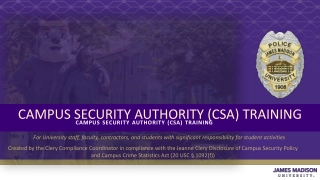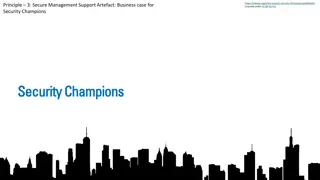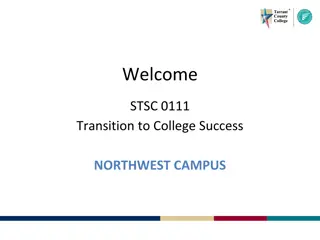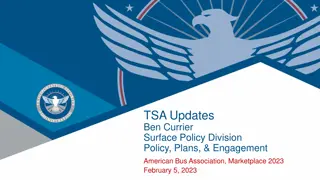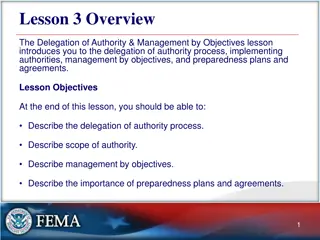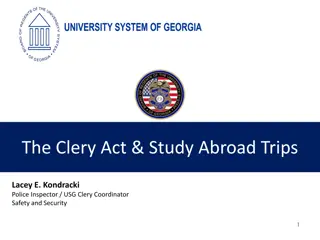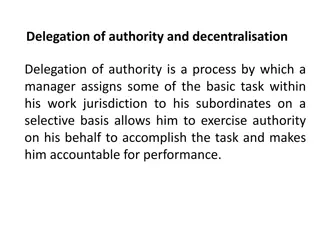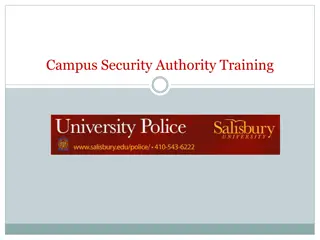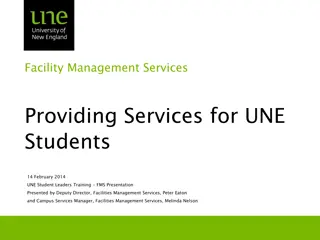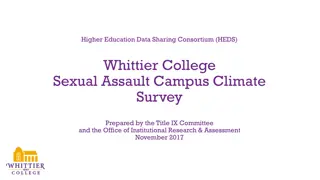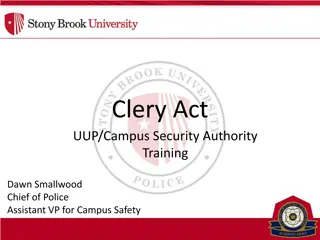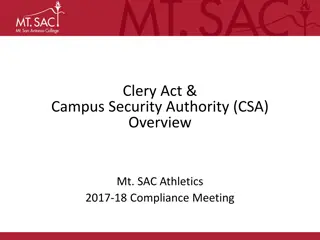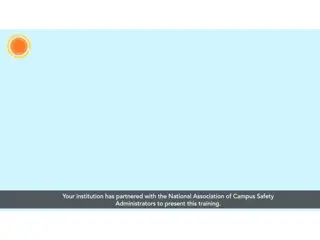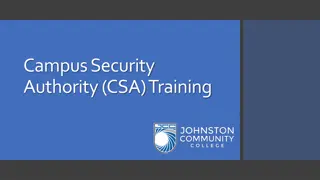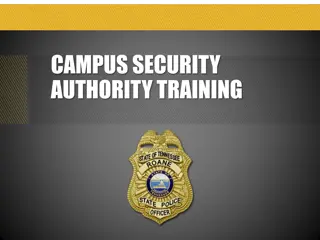Campus Security Authority Training at Wofford College
Gain insights into the responsibilities of a Campus Security Authority (CSA) at Wofford College, including reporting Clery Act crimes to Campus Safety. Learn about the Clery Act, who qualifies as a CSA, specific responsibilities, and crimes to report. Understand the significance of maintaining campus safety and security information, as mandated by federal law.
Download Presentation

Please find below an Image/Link to download the presentation.
The content on the website is provided AS IS for your information and personal use only. It may not be sold, licensed, or shared on other websites without obtaining consent from the author. Download presentation by click this link. If you encounter any issues during the download, it is possible that the publisher has removed the file from their server.
E N D
Presentation Transcript
Wofford College CAMPUS SECURITY AUTHORITY TRAINING What you need to know
Objective of this training Understand and carry out your responsibilities as a Campus Security Authority (CSA) to report allegations of Clery Act crimes to Campus Safety.
Agenda and Overview Overview of the Clery Act Who is a Campus Security (CSA) at Wofford? Responsibilities of a CSA under the Clery Act Crimes you should report Reporting Crimes
Overview of the Clery Act oThe Jeanne Clery Disclosure of Campus Security Policy and Campus Crime Statistics Act ( Clery Act ) was enacted in memory of Jeanne Clery, a student who was raped and murdered by a fellow student in her Lehigh University residence hall in 1986. oIt is a federal law administered by the U.S. Department of Education that requires institutions of higher education participating in federal financial aid programs to maintain and disclose campus crime data and security information about crime on and around campus as well as recognized and sanctioned trips away from campus reported to local/college law enforcement and people in positions that the Clery Act identifies as Campus Security Authorities (CSAs).
Overview Continued oThe Clery Act requires the college to: oPublish crime statistics and safety information each October. oMaintain a daily crime log, issue timely warnings and emergency notifications. oMake security policies available (located in the Annual Security and Fire Safety Report). oThe current Wofford College report (Annual Security and Fire Safety Report) is available on the Campus Safety website: https://www.wofford.edu/student-experiences/campus-safety/crime- and-incident-reports.
Who is a Campus Security Authority at Wofford? oCampus Safety Officers and dispatchers. oNon-security staff who monitor college property. oIndividuals/organizations that receive reports of criminal activity from students. oAn official who has significant responsibility for student and campus activities (including faculty and staff who take student groups off-campus on overnight trips generally lasting more than one night).
CSAs Specifically at Wofford Campus Safety staff Residence life staff (director/assistant, RAs and RLCs) Dean of Students/staff Greek Life staff Students who monitor fitness center doors Title IX staff Event staff (includes EPI staff at athletic, Greek Life, and other events as well as off duty officers hired for athletic and other events) Human Resources director Faculty/staff advisors to student organizations Athletic Director/associate/assistant directors, all coaches (paid/volunteer) and trainers Student activities staff
Who is not a CSA oFaculty not having responsibility for student activities beyond the classroom (does not include faculty/staff taking students on overnight trips away from campus). oClerical staff. oFacility or food service staff. oPastoral or licensed professional counselors working within scope of counseling duties (does not include work outside of counseling function such as teaching or advising a group).
CSA Responsibilities oDial 4911/911 in an emergency or if anyone is in immediate danger. oProvide resources to the individual for help and support. oInform the individual that you must report the incident (can be reported as a confidential statistic). oReport allegations of Clery Act crimes to Campus Safety that are concluded to have been made in good faith as soon as possible. oIf you believe a crime has occurred, you must report it.
Not your CSA Responsibilities oRun after or attempt to apprehend the alleged perpetrator. oTry to coerce or force the victim to contact Campus Safety or local law enforcement if they do not wish to. oInvestigate the incident or try to determine whether the crime took place.
Crimes You Should Report Certain types of crimes, committed at specific locations (campus owned or controlled and adjacent public property, which also includes leased property contracted by the college or recognized student organizations), are required to be reported under the Clery Act. The crimes listed in this training, along with definitions, are included on the Campus Security Authority Incident Report Form located in the CSA section of the Campus Safety webpage. You will be asked to make an initial incident type determination attempt when reporting. Campus Safety will determine the final incident type so don t worry about making an incorrect incident type determination. The incident report form will also ask for a location. Again, use your best judgment.
Crimes You Should Report (Cont.) Criminal Offense Homicide Murder/non-negligent manslaughter Negligent manslaughter Sexual assault Forcible (rape/fondling) Non-forcible (statutory rape/incest) Robbery Aggravated assault Burglary Motor vehicle theft Arson
Crimes You Should Report (Cont.) Hate Crimes Motivated by bias based on: Larceny/theft* Race Simple assault* Gender Intimidation* Religion Vandalism/destruction of property* National origin Criminal offenses listed in previous slide Sexual orientation Gender identity Ethnicity Disability
Crimes You Should Report (Cont.) Violations Other Crimes Liquor law Domestic violence Drug law Dating violence Weapon law Stalking incidents
Reportable Crime Locations On campus e.g. residence halls or administrative buildings (includes Goodall Center, Terrier Plaza, Magnolia Manner, Northside Commons and the Office of Marketing and Communications building). Public Property e.g. sidewalks on both sides of Church Street, from Evins Street to Memorial Drive, Osage Street to Memorial Drive, and Cummings Street past Facilities. Non-campus property e.g. leased (or used by agreement) athletics facilities for teams or clubs, hotels used for overnight travel longer than one night or hotels regularly used throughout a year or over multiple years.
How to Report a Crime The preferred method of making a report is by filling out the CSA Crime Report Form available on the Campus Safety website. You can also make a report directly at the Campus Safety office located near the post office in the Mungo Student Center. As with any report to law enforcement, specific information is key. Include the following in your reports: What type of crime? Where did it occur? When did it occur? When was it reported to you? Who was the victim? * Were there any witnesses? * Are there any suspects? * * Indicates information the victim may not want shared, which is OK.
Questions? Please send any questions to: Randy Hall in Campus Safety: halljr@wofford.edu/864.597.4351


